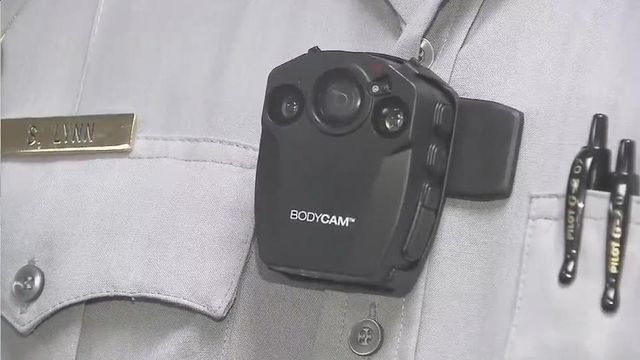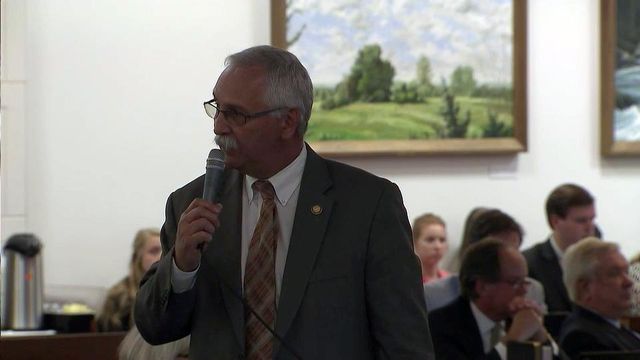Police video bill wins NC House vote
A proposal for a legal framework governing access to video gathered by law enforcement agencies won tentative approval in the state House Thursday.
Posted — UpdatedHouse Bill 972 is the product of months of work by House lawmakers with law enforcement, the legal community and citizens' advocates. It covers body camera video as well as footage from dashboard cameras and police surveillance cameras. While critics say it doesn't go far enough, supporters say it's a step in the right direction.
Under current law, many law enforcement agencies classify body camera video as a personnel record, making it almost impossible for the public to access. Dashboard camera video, however, has been more accessible. That will change under the proposal, which treats all video the same way. It declares that law enforcement video is not a personnel record, but that it is also not a public record.
The proposal would limit viewing of a police video to only those members of the public who are captured in the video, and then only with the police chief's agreement. The citizen and his or her attorney or other representative could view it but could not copy or photograph it. The law enforcement agency and the local district attorney would also have access to the video.
A District Court judge could allow other parties to view the video if they present valid reasons why they should be allowed to see it, and if the judge finds the request does not violate seven conditions included in the bill, from highly personal content to a potential risk to public safety.
Only a judge could make a police video public.
Sponsor Rep. John Faircloth, R-Guilford, said the measure was requested by law enforcement agencies looking for guidance in handling the ballooning expansion of technology.
"Everybody’s got a camera now. Everybody’s taking pictures," Faircloth said. "Unfortunately, some of that gets abused. Some of that causes problems."
Rep. Bill Brawley, R-Mecklenburg, said it represents progress while protecting the public's basic expectation of privacy in dealings with the police.
"This isn't a hard issue. Video camera [videos] currently are not regularly released. We are setting up a procedure to allow that information to be given to stakeholders and to come into the public space in a reasonable and restrained manner," Brawley said.
"We bent over – literally bent over – backwards to try to make this bill as neutral as we could make it," said co-sponsor Rep. Allen McNeill, R-Randolph, "so that it’s as much in the middle as we could possibly do between law enforcement and between the citizens."
Some Democrats argued that the proposal should include a presumption that video records should be made available to the public absent a compelling reason to keep them confidential.
"Given the atmosphere in this country today, I think it’s so important that we release these videos. Ninety percent of the time, it works to the police’s benefit, and it always works to the public benefit," argued Rep. Billy Richardson, D-Cumberland. "Absolutely in this state, we want the people’s business to be open. It’s a basic, fundamental right. It’s a basic, fundamental part of being an American. We do things out in the open, folks. We don’t do it behind closed doors."
Rep. Joe Sam Queen, D-Haywood, said the public "has asked for body cams. Why? So they can see what their law enforcement are doing."
Requiring a court order to make a video public, Queen argued, "makes it really tough on the citizens. They have to lawyer up. They have to spend a lot of money. They have to jump through a lot of hoops to get the access that, for the most part, should be publicly available."
"Law enforcement agencies work for us. They’re paid with our tax dollars, and we have a right to expect the best from them in public service," added Rep. Larry Hall, D-Durham. "If these are the people’s records, if they have the right to see them, should they be able to see them absent these restrictions? The answer is yes."
But the bill's sponsors turned back attempts to add any such presumption to the bill. If public access to police video were loosened, Brawley said, "We will have city councils unwilling to do body cameras. We will have police officers unwilling to wear them."
"If we’re going to do that, why don’t we just put them all online? We could even run a TV show, 'TV’s Most Exciting Police Videos,'" he argued. "We keep coming up with bills that seem to be designed to make sure that every piece of police video, sooner or later, ends up on the 6 o'clock news."
The measure passed 87-19, with bipartisan support. It's scheduled for a final House floor vote Monday evening. After that, it still needs to go through the Senate, where leaders said Thursday they're planning to shut down committees early next week in preparation for the end of the legislative session.
• Credits
Copyright 2024 by Capitol Broadcasting Company. All rights reserved. This material may not be published, broadcast, rewritten or redistributed.






